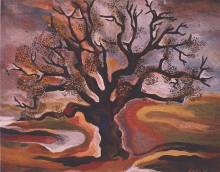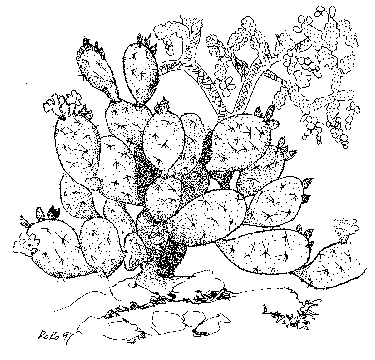


Interview with Rotraud Rospert of ZEGG
|
You are viewing: www.nfnc.org |
| Navigate |
|---|
| Home |
| Network Contacts |
| Discussion Group |
| Document Library |
| Favorite Quotes |
| Members' Projects |
| Members' Pages |
| Other Resources |
| Request More Info |
| Coming Events |
| Local Meetings |
| Summer Camp |
| Spring Gathering |
| Winter Gathering |
| Past Events |
| Summer Camp '04 |
| Summer Camp '03 |
| Spring Fling '03 |
| Summer Camp '02 |
| Summer Camp '01 |
| Summer Camp 2K |
| Winter Wkshop 2K |
| Summer Camp '99 |
| Winter Wkshop '98 |
| Summer Camp '98 |
| Summer Camp '97 |
| Winter Camp '96 |
| Summer Camp '95 |
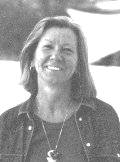 (This interview with Rotraud Rospert was done after a visit to
America where she traveled throughout California, Oregon and Arizona
visiting community groups inspired by the ZEGG community. She
conducted 2 workshops with Jon Russell entitled "Eros, Partnership and
Community" where the participants got to experience many of the
possibilities around love and relationships in community. The
questions here were posed by Pati Diehl from the Portland group. The
art on this page was all done by Rotraud.)
(This interview with Rotraud Rospert was done after a visit to
America where she traveled throughout California, Oregon and Arizona
visiting community groups inspired by the ZEGG community. She
conducted 2 workshops with Jon Russell entitled "Eros, Partnership and
Community" where the participants got to experience many of the
possibilities around love and relationships in community. The
questions here were posed by Pati Diehl from the Portland group. The
art on this page was all done by Rotraud.)
Rotraud, how long have you been part of ZEGG? I joined the project in 1984. At that time it was called project Meiga and ZEGG had not been created yet. The community was in several different locations during the early years until 1991 when we bought the property we now call ZEGG. And so I have been part of ZEGG since it's beginning. What made you want to be part of that project
in the beginning?
When I joined the project in 1984, I was living as a single person, my daughter had already grown up, and I was looking for new possibilities to live more successfully, with more fun, with more friends and with more responsibilities than just for myself. I found that this group shared my ideas of creating a world without fear and violence against each other, and against nature and animals. I really wanted to do something new and significant. I also discovered that to live in community means to change many of our habits and structures and that was very interesting to me. You wanted to do that? Yes, because my life had become boring and I was looking for much more expression of my self. I had been working as a social worker with battered women and I was getting frustrated with that because I could see how they weren't changing. The way they were looking at their situations was not making any improvements and I was disappointed in that. I could see that these women were often creating these situations too, just as the men were, and I wanted to find a new way. I found that in community there are so many possibilities to work with different adults and children, to create situations where people could really talk the truth, instead of lying to each other out of fear of being rejected or fear of hurting another's feelings. We could create an environment that supported us in learning how to be truthful at a new level. I wanted that. So were there a lot of interesting things going on there when you first got involved? Yes. The first was that I found a whole new world
of communication where, for example in the forum, you would gain so much.
I would be very afraid of showing myself, but once I did it I felt very
free and bigger than before. We were able to see how once we really knew
someone, they became very easy to love, but we'd never know that at first.
At first we are afraid and think people won't like us if we show our real
selves, but just the opposite is true, if we are really truthful.
And then there was the art. I discovered I was an artist. I spend a lot of time doing art now - painting, drawing, sculpture, totems. I spent time in Australia with the Aborigines and learned much from them about their art. In the early days some of the artistic events we did in the community were very new for me. For example a woman would sit in the center of a circle and all around her the other people would be dancing around or sitting there drawing this person and there would be such an erotic atmosphere doing art that I never would had imagined would be possible in such a large circle of people.
We also did theater. We would do theater about the common issues we faced in our life and in our culture. We did things about love and jealousy and fighting over the same man or woman. We had a theater group that did plays based on the book "Eros Unredeemed," about new ways of looking at love and relationships. When we worked in this theater we would understand a lot about ourselves and our structures. Also, being on stage is a powerful experience in itself. On stage you can be much bigger than your previous thoughts of yourself, you are not so identified with your small self. There was a lot of activity in the community. There were about 50 people there at that time and everyone had some sort of project they were involved in. Besides the things I mentioned there were people working in the garden, some working with the children, some renovating buildings. We did many things together. In the evening we would often meet in the library and we would have discussions about what was going on in the world and we'd often do forum in the evening so people could deal with the issues that were coming up during the day. Was it a lot of philosophizing about all these things? Not just that, we did a lot of exercises and experiences to actually see what would happen if we tried living in a new way. For me at the beginning one of the most scary and challenging things was to step into the forum and to show myself. I was very shy. I was embarrassed to have people look at me. I was excited to be in the community but I didn't want anyone to really notice me or ask me things about myself, I was so shy. I thought they would not like me and that I was so strange. So in the beginning I didn't step into the forum very much. Later I did discover the real value in it and started using it a lot to deal with the things that were coming up in my life or with my boyfriend Karston, and it really helped to deepen our relationship. So what kinds of relationships were there in the community, were you monogamous with your boyfriend? We both had other heart and sexual relationships and contacts in the community during that time. We were all very curious to discover how big were the possibilities to share our hearts and our sexuality with other people. We wanted to discover that, and we were researching that. We were all researchers. This was an environment that people could support each other in this task because even though it was very exciting it wasn't always easy. So now that many years have gone by since those
early days, what's important for you at ZEGG?
During the last few years many things have changed at ZEGG. We have gone through many different levels of leadership, like a single leader then a group of four, then a group of six and then again the leadership by a single woman with a team. So we've gone through many different levels of social structures. For me it's interesting because every year it's changing. We are careful to never create structures which we declare we will keep for many years. We let them shift whenever we discover something new about ourselves. These are things like who we want to live with, what families we wish to create, how we want our leadership, if we want to work a lot now or if we want time out, if some want to do more traveling and exploring or create new projects, or doing more study on ecological themes or visiting other communities. Like Janine Mueller, she just spent several months in India at Auroville and has come here to the US several times to help the groups here just like I do. I myself have decided to spend 2 months each year traveling. So in the last few years we are all creating a network, an international network. We want to connect with many people all over the world. We don't want to be just an island. ZEGG is much more a point from where people can spread out all over Germany and many other countries. We want to connect with others who share this vision for transforming the planet. This is the main task we are all working on. There are times when ZEGG is like a railway station (laughs) and people are coming and going and there's lots of excitement. Then if that becomes too much we step back for a while and think about how we might now want to create a place that's more relaxed. So even though we do all this traveling and networking and projects we all really feel that ZEGG is our home. An important part of this is for the people to bring back home all of the new experiences that they've had in the other communities and with other people. I spent several months with Aborigines in Australia that gave me lots of information and experiences I could share with others at ZEGG. So this is what got you here to America. And now that we are trying to create some similar projects, what do you think about what's evolving here? I like it. It's like a small plant that's growing and I really like the process. It does take time too. Like our project that has now existed for 20 years. It was just a small seed and it's become this big plant now. I believe that the project here in America can grow faster than we did - I see people here, for example Jon and Miaya, that are committed to creating structures where new people can fit in, and that was a slower process for us early on at ZEGG. Like the Portland group and the Tucson group are growing more easily. It's like the morphogenetic field, because now people don't have to do all of the very difficult steps we did. Now people can walk faster because they gain from our experiences. Also the people who come from America to ZEGG have their own experiences and create experiments there and share them when they come back to America. So what have you felt your role is here in America? For me it's a big excitement to share with new people the experiences I've had, and to support them in the path they are going. Also their path may be a little bit different and that doesn't matter, but to give them support and encourage them to try something different than before. I feel enriched by being in America, to study the American human being (laughs) and I bring them the German human being, and each part is valuable, and when we put them together I think we are creating something new. What changes or evolution in the American groups have you noticed since you were here last year? I have noticed more depth. People like to connect more, to experience more. And people who were already involved have really created a network amongst themselves, and they support each other. I really got this sense. People travel from Portland to Tucson and from San Francisco to Portland, and there's a lot of movement and I like that because people in this way find the groups where they really fit together instead of only staying in one place and trying to force a group to form where not everyone fits together. Yet they all share a larger vision and this network supports people to find the others that they can share excitements with. The workshops you two have just finished, are they different in any way than the others you've done here in the past, and what effect do you think these have had on the American Project? I can say it was a new step because this time a German woman and an American man worked together and that was a new experience. I see that the next step is that the Americans also start a leadership or a facilitation that's supported by a German but that is an American project and not a copy of a German one - one that creates it's own communication structures and social structures. I want to encourage you to create something new. Everyone is their own researcher, we each need to do our own work and make our own discoveries. Each group creates something new that comes from themselves. This is what makes us grow and makes it interesting. I would like to know how important you feel the women's field is in what's going to happen here in America? The women's field is the most important thing. I think the women's field will become very strong in the American project. When I was in Portland with the women I felt how strong the women are. I could feel how serious they were to find solutions, like to their motherhood questions - such as how they could support each other in child care, or the questions of how they can support each other when they are in love with the same man. We had so many good examples of these things when I was up there and we were really working through these. And the women really opened their hearts and their minds to dig into these unspoken issues about competition, jealousy and fears and all that. Are competition, jealousy and fear big issues in people coming together in community? Yes. It is a main part of the struggle in the beginning. Because when people start opening up after living a life of fear and hiding and then really see each other then they start falling in love, and with many others, and that's the beautiful part, but because it's so new it also can look like chaos. So it's important to have a mental or intellectual understanding of these things so we can work on our fears and jealousy. We all experience this, it doesn't mean we should try not to be jealous anymore, but we can work with that so that our new openness and love doesn't shut down out of the confusions that come whenever we try something new. If we really care about each other and understand what we are trying to do we can move through these things and have real community. I discovered for example that women are often afraid to open up with another woman. Yes they have friendships, but when a man comes between them the friendship falls apart because they concentrate on the man. But we can break through this old pattern and create something between us that is entirely new and not like the old patterns, where we support the other woman and share with the other woman why you love this man - and you both love this man so you communicate why and all these things and come close and support each other. This is what's new. Have the women at ZEGG been able to experience this level of clarity and support for each other? Yes, we have been doing a lot of work with this. We've had women's groups and meetings for years, and we gained so much through that. And when I was up at Portland I could see it's already happening there, the women are coming together and sharing their visions and their struggles and helping each other with their confidence. And in Tucson I can see that something is happening there already too. These women are very strong. The women also need to come together to support the men in the community. That's another important part of the women's field, to ask questions about how they can work together to support the men so that the men find it easier to give love to the women.
So now that you are going back to Germany, what do you see in your future with the American Project? Oh, I would like to come over here every year, maybe one or two times to see my friends. That's important for me. And also I want to support them in their growing and to give water to the plants. (smiling) I'm excited about doing this and it's starting to feel like a second home to me. I feel very welcome here and I like my friends here very much. |
 Designed by
Designed byWebSPinner



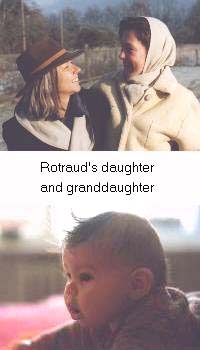
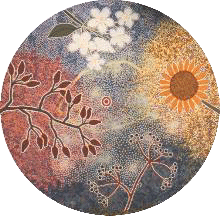
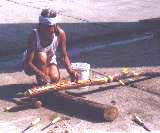 And there was also very much music. When I was
first in the community I was excited to see so many people singing in
the chorus, but I was very shy. But I said to myself, "Someday I want
to be in this chorus and to sing with all these people," and this was
a vision I had. And now today (smiling) I am part of this chorus, and
I like it very much.
And there was also very much music. When I was
first in the community I was excited to see so many people singing in
the chorus, but I was very shy. But I said to myself, "Someday I want
to be in this chorus and to sing with all these people," and this was
a vision I had. And now today (smiling) I am part of this chorus, and
I like it very much.